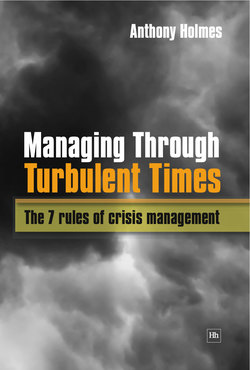Читать книгу Managing Through Turbulent Times - Anthony Holmes - Страница 9
На сайте Литреса книга снята с продажи.
2. What are the limits to management?
ОглавлениеIn this chapter I want to consider the role of management. In chapter 3 I discuss how the practice of management alters throughout the corporate lifespan, and in chapter 4 how the psychology of managers changes as economic conditions deteriorate and the stability of their company is jeopardised.
The late Peter Drucker [5 ] has been called the most influential management thinker of modern times. His 1954 book entitled The Practice of Management was a seminal work which described what has become known as management theory.
According to Drucker it is the application of management that makes resources productive. Not capital. Not labour. But management.
He also said that the management function embraces certain basic beliefs of modern Western society, in particular the belief that it is possible to control man’s livelihood through the systematic organisation of economic resources.
John Kotter [6 ] states that the role of the manager is to perform the following four functions:
1 Planning: The science of logically deducing the means to achieve given ends.
2 Budgeting: Reducing plans to financial programmes.
3 Organising: Creating an organisational structure to facilitate the accomplishment of the plans.
4 Controlling: Monitoring progress to identify deviations from the plans and budgets, and implementing actions to rectify any adverse variance.
This summarises the rationalist practice of reductionism otherwise known as scientific management. All the functions described in the table above relate to the formulation and execution of a plan in a predictable climate and indicate why radical and unexpected changes to the anticipated operating environment disrupt the model. Usually these plans are based on data for earlier periods but are implemented in a subsequent period in which the operating environment will have changed, but only in subtle ways, that differ from that predicted.
When the economic system encounters a recession or some other significant negative event such as a major war (known as a high impact, low probability event or HILPE) then changes to the operating environment become rapid, occasionally sudden, and the effect on organisations can be so profound that the basic condition of stability that underpins management’s rational processes is absent.
Kotter’s functions contain no comment about building in flexibility and adaptability that allow the plan to evolve. He tends to be concerned only with the rectification of deviations from the plan to enable the agreed programme to get back on track. Something that is probably not feasible when turbulence is encountered.
Having observed the catastrophic virtual collapse of the world financial system in 2008 and the precipitous descent into global recession we are forced to conclude that either:
1 Drucker and Kotter were wrong and that the economic environment is not a knowable and controllable place.
2 Those charged with the management of the system have abandoned the techniques designed to maintain control.
3 The techniques themselves are deficient.
I suggest that most of the answer lies in 1 and 3 above.
The world economic system is not like a machine in which the function, behaviour and relationship to one another of the component parts can be described in mechanistic terms. In recent years we have come to understand that it is a complex system that behaves in a chaotic way, [7] like the weather or a crowd of people leaving a stadium, and that it is prone to sudden and apparently unpredictable changes.
It is difficult to control a dynamic system that you cannot predict and for this reason alone management, during times of turmoil, cannot rely on the systematic tools that they use when the world seems a more reliable place.
The established techniques of management science seem to work in the spring and summer of the business cycle but become unreliable in the winter.
In turbulent times the urgent time frame of action and the necessity to modify plans and budgets in response to unexpected events added to the possibility of their ‘out of trend’ scale cannot be accommodated by the rigid adherence to established processes on which scientific management depends.
Yet the ultimate test of management is performance. Achievement rather than comprehension remains, of necessity, the aim. Management, in other words, is a practice, rather than a science or a profession, although it contains elements of both.
Indeed, I suggest that if managing in stable periods is a science then in turbulent times it is more of an art.
